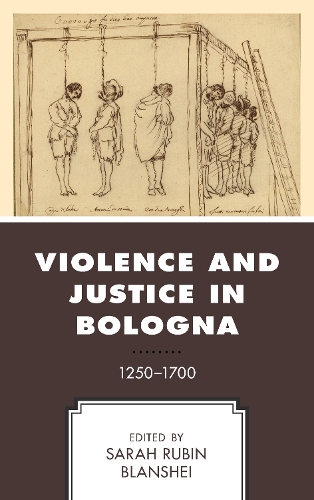
Violence and Justice in Bologna: 12501700
(Hardback)
Publishing Details
Violence and Justice in Bologna: 12501700
By (Author) Sarah Rubin Blanshei
Contributions by Sarah Rubin Blanshei
Contributions by Margaux Buyck
Contributions by Christopher Carlsmith
Contributions by Sara Cucini
Contributions by Trevor Dean
Contributions by Carol Lansing
Contributions by Gregory Roberts
Contributions by Colin S. Rose
Contributions by Massimo Vallerani
Bloomsbury Publishing PLC
Lexington Books
2nd April 2018
United States
Classifications
Professional and Scholarly
Non Fiction
945.41104
Physical Properties
Hardback
300
Width 158mm, Height 239mm, Spine 27mm
608g
Description
This collection of essays offers a unique contribution to the study of violence and justice in a late medieval and early modern Italy by combining a multivocal perspective with a case-study focus on the city-state of Bologna. Drawing on the citys singularly rich archival resources, the authors explore various facets of violenceranging from the interpersonal to the less frequently studied typologies of blasphemy, rape, political rebellion, and student brawlsand set the institutions of the police and law courts into their socio-political and cultural contexts. They also apply a broad variety of quantitative and qualitative approachesprocessual, microhistorical, legalism, comparative and criminologicalto their assessments of the procedures and practices of criminal justice and the experiences of violent behavior, providing both short-term, in-depth analyses of specific events and over-arching reviews of long-term trends. Bologna itself, with its renowned university, economic innovations, strategic importance as a commercial and cultural crossroads, its political volatility and experiments with diverse constitutional structures, provides a rewarding laboratory for analyzing changes and continuities in late medieval and early modern violence and justice. From these studies emerges a narrative that challenges the traditional portrayal of those periods as eras when brutality and rage were normal in social relations and criminal justice was characterized mainly by punitive strategies of torture and repression.
Reviews
The ten studies included in this volume offer fresh perspectives on criminal justice in late medieval and early modern Bologna. Drawing on the data preserved in the citys exceptionally rich judicial archives, these informative and accessible studies reveal that neither the ebb and flow of violence and crime nor intricate judicial procedures and practices can be understood apart from Bolognas shifting political contexts. The volume, meticulously edited by Sarah Rubin Blanshei, who places each study within a larger comparative framework, makes an indispensable contribution to late medieval and early modern history. -- Julius Kirshner, University of Chicago
This important collection of essays explores critical questions about criminal justice and the nature of violence in late medieval and early modern Bologna. Sarah Rubin Blanshei harmonizes the perspectives of leading scholars in the field as well as the voices of new scholars to offer a wide variety of approaches and methodologies. The result is a fascinating view of continuity and change in violence and criminal justice in Bologna over a period of nearly five hundred years. -- Joanna Carraway Vitiello, Rockhurst University
Were the better angels of our nature hard at work civilizing Europeans in the centuries from the Renaissance to the Enlightenment Was violence falling and justice rising These essays dig into the extraordinary wealth of Bolognas criminal archives to shed light on some of the most hotly disputed questions around crime and justice in the critical early modern period. Victims voices, defendants pleas, magistrates opinions, and authorities strategies all weave together in a series of studies that demonstrate the many forms of violence that rocked Italian society, and the many judicial institutions that evolved to clean up or at least mediate the damage. Who murdered, stole, blasphemed, or fought and why How did magistrates and judges do their work These authors also tackle the big debates: Are expanding judicial systems a centralizing tool for an expanding state, or improvised vehicles for negotiating individual conflicts Must weor even can wedecide -- Nicholas Terpstra, University of Toronto
Bologna, one of few cities that offer such a varied range of governments and the extensive survival of criminal records throughout this period, serves as the laboratory for a balanced mix of established and junior scholars to dissect the workings of a wide range of courts. This volume offers a phenomenal introduction to the different approaches to studying criminal justice and the debates within it, offering a much-needed reminder of how integrated justice and politics can be. The authors challenge widely held assumptions about vendetta, rape accusations, student violence, and much more, as they problematize any attempt to show linear or smooth developments in criminal justice across the period. The essays differing foci on enforcement, investigations, and trials provide an extensive view of the judicial processes and personnel, but also address why potential litigants chose specific judicial mechanisms or abandoned them. The mix of engaging case studies and quantitative analyses reinforces just how much the status of offenders and victims and the political climate influenced legal rights, enforcement, and sentencing. -- Glenn Kumhera, Penn State Behrend
Author Bio
Sarah Rubin Blanshei is professor of history emerita at Agnes Scott College.
